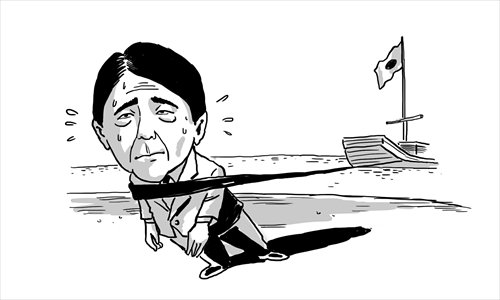Abe can turn away from nationalism

Japan's Liberal Democratic Party (LDP) won an overall majority in the election Sunday, leaving former prime minister Shinzo Abe set to return to power as Japan's prime minister after five years. Where will Japan go under another Abe administration? And how will the Sino-Japanese relationship, currently at a low ebb, develop?
Abe advocates a quantitative easing policy in Japan, targeting an inflation rate of 2 or 3 percent. Appointing a central bank president to implement the policy, increasing public expenditure and lowering the interest rate will stimulate Japan's economy to reach a 3 percent growth rate. These propositions won favor with voters, given the failed economic policies of the incumbent Democratic Party of Japan (DPJ).
In fact, the majority of Japanese voted for Abe's economic plans, since other parties didn't come up with such concrete economic means and goals. If Abe's suggestions are put into practice, they're likely to stimulate Japan's economy. At the least, they will help boost the Japanese public's confidence in the economy. Abe's economic ambitions give hope to Japanese for economic recovery, but some are also worrying that, as a nationalist right-winger, he might bring danger to Japan as well as China.
Abe is in favor of a series of tough nationalist propositions such as amending the pacifist clauses of the Japanese constitution, increasing the budget to further equip the Self-Defense Forces of Japan, strengthening the Japanese Coast Guard and so on. Abe strongly attacked the diplomacy of the DPJ, highlighting the LDP's resolution to safeguard Japan's territory. These right-wing suggestions, with amending or even abolishing the pacifist clauses at their core, are aimed at paving way for Japan's military activities and war behaviors.
Postwar Japan has been under the military and nuclear shield of the US. Even without US protection, the country's relatively powerful military strength acts as a deterrent. North Korea's military strength and technology are incomparable to Japan's despite its ambition to develop nuclear weapons. Other countries in East Asia are all keen on a peaceful development plan against the backdrop of an overall peaceful international environment. If Abe stubbornly promotes nationalist policies after coming to power, Japan will take a dangerous turn.
What's worse, Abe insists on a tough stance over the Diaoyu Islands dispute with China, suggesting Japan never compromise over the issue, never admit the existence of the territorial dispute and never accept joint management of the islands with China. Given these, China and Japan risk further escalating conflicts or confronting each other after Abe returns to office.
But let's hope that Abe is a practical politician. Being tough on China may help increase popularity and attract right-wing votes during election campaign. Yet Abe must realize that a continuing confrontation with China will hurt Japan's interests in the long run in light of the loss brought by the current administration's provocations over the Diaoyu Islands. Japan will lose the huge Chinese market, hitting its economy just as it tries to recover.
When assessing Abe, Chinese analysts often emphasize the influence of his grandfather Kishi Nobusuke, a Japanese prime minister in the late 1950s, on him. Nobusuke was quite antagonistic to China in the postwar period. However, Abe's father, Shintaro Abe who once served as Japan's foreign minister, contributed to friendly Sino-Japanese relations in the 1980s. The younger Abe himself made an ice-breaking trip to China when he was Japan's prime minister for the first time, mending the damage done by former prime minister Junichiro Koizumi's visits to Yasukuni Shrine.
Therefore, we have reason to expect that Abe can use earnestness, courage and wisdom to once again lift Sino-Japanese relations from a low point. This will not only benefit Japan, but also the whole of the Asia-Pacific region.
The author is deputy director of the Japanese Studies Center at China Foreign Affairs University. opinion@globaltimes.com.cn